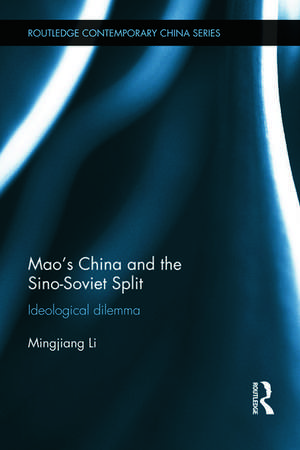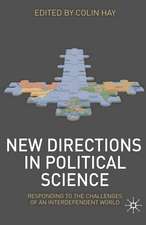Mao's China and the Sino-Soviet Split: Ideological Dilemma: Routledge Contemporary China Series
Autor Mingjiang Lien Limba Engleză Hardback – 9 feb 2012
This book will be of essential reading to anyone interested in Chinese-Soviet history, Cold War history, International Relations and the theory of ideology.
Din seria Routledge Contemporary China Series
-
 Preț: 311.14 lei
Preț: 311.14 lei -
 Preț: 339.64 lei
Preț: 339.64 lei -
 Preț: 311.41 lei
Preț: 311.41 lei -
 Preț: 280.32 lei
Preț: 280.32 lei -
 Preț: 310.31 lei
Preț: 310.31 lei -
 Preț: 342.51 lei
Preț: 342.51 lei - 18%
 Preț: 1059.45 lei
Preț: 1059.45 lei - 26%
 Preț: 848.57 lei
Preț: 848.57 lei - 18%
 Preț: 1223.21 lei
Preț: 1223.21 lei - 18%
 Preț: 1065.06 lei
Preț: 1065.06 lei -
 Preț: 426.56 lei
Preț: 426.56 lei - 18%
 Preț: 959.27 lei
Preț: 959.27 lei - 18%
 Preț: 1173.97 lei
Preț: 1173.97 lei - 18%
 Preț: 1049.06 lei
Preț: 1049.06 lei - 18%
 Preț: 1220.42 lei
Preț: 1220.42 lei - 18%
 Preț: 1222.16 lei
Preț: 1222.16 lei - 25%
 Preț: 823.99 lei
Preț: 823.99 lei - 18%
 Preț: 1061.93 lei
Preț: 1061.93 lei - 18%
 Preț: 1061.57 lei
Preț: 1061.57 lei - 18%
 Preț: 1115.33 lei
Preț: 1115.33 lei - 18%
 Preț: 1008.02 lei
Preț: 1008.02 lei -
 Preț: 423.30 lei
Preț: 423.30 lei - 25%
 Preț: 823.99 lei
Preț: 823.99 lei - 18%
 Preț: 1117.43 lei
Preț: 1117.43 lei - 15%
 Preț: 702.39 lei
Preț: 702.39 lei - 25%
 Preț: 526.88 lei
Preț: 526.88 lei - 18%
 Preț: 712.13 lei
Preț: 712.13 lei - 18%
 Preț: 1065.06 lei
Preț: 1065.06 lei - 18%
 Preț: 703.09 lei
Preț: 703.09 lei - 18%
 Preț: 1060.87 lei
Preț: 1060.87 lei - 18%
 Preț: 1058.79 lei
Preț: 1058.79 lei - 18%
 Preț: 1062.98 lei
Preț: 1062.98 lei - 18%
 Preț: 1222.16 lei
Preț: 1222.16 lei - 18%
 Preț: 1055.51 lei
Preț: 1055.51 lei -
 Preț: 413.55 lei
Preț: 413.55 lei - 18%
 Preț: 1001.84 lei
Preț: 1001.84 lei -
 Preț: 386.57 lei
Preț: 386.57 lei - 18%
 Preț: 1057.75 lei
Preț: 1057.75 lei - 18%
 Preț: 1057.75 lei
Preț: 1057.75 lei - 18%
 Preț: 1061.57 lei
Preț: 1061.57 lei - 18%
 Preț: 1058.79 lei
Preț: 1058.79 lei - 18%
 Preț: 1109.18 lei
Preț: 1109.18 lei - 18%
 Preț: 1052.89 lei
Preț: 1052.89 lei - 18%
 Preț: 1053.16 lei
Preț: 1053.16 lei - 18%
 Preț: 728.24 lei
Preț: 728.24 lei - 18%
 Preț: 1058.79 lei
Preț: 1058.79 lei - 18%
 Preț: 1165.20 lei
Preț: 1165.20 lei - 18%
 Preț: 1227.38 lei
Preț: 1227.38 lei - 15%
 Preț: 701.45 lei
Preț: 701.45 lei
Preț: 822.01 lei
Preț vechi: 1104.00 lei
-26% Nou
Puncte Express: 1233
Preț estimativ în valută:
157.33€ • 163.61$ • 131.65£
157.33€ • 163.61$ • 131.65£
Carte tipărită la comandă
Livrare economică 15-29 martie
Preluare comenzi: 021 569.72.76
Specificații
ISBN-13: 9780415698368
ISBN-10: 0415698367
Pagini: 224
Dimensiuni: 156 x 234 x 18 mm
Greutate: 0.57 kg
Ediția:1
Editura: Taylor & Francis
Colecția Routledge
Seria Routledge Contemporary China Series
Locul publicării:Oxford, United Kingdom
ISBN-10: 0415698367
Pagini: 224
Dimensiuni: 156 x 234 x 18 mm
Greutate: 0.57 kg
Ediția:1
Editura: Taylor & Francis
Colecția Routledge
Seria Routledge Contemporary China Series
Locul publicării:Oxford, United Kingdom
Public țintă
Postgraduate and UndergraduateCuprins
1. Introduction 2. Ideological Dilemma in International Politics 3. The Soviet 20th Party Congress and Emerging Disputes in 1958 4. Mao’s Great Leap Forward and Sino-Soviet Disputes, 1959-1960 5. Temporary Calm and Deterioration in Relations, 1960-1962 6. The Growth of Domestic Radicalism and Polemics with Moscow, 1963-1964 7. Short-lived Détente and the End of Party Relations, 1965-1966 8. Sino-Soviet Confrontation during the Cultural Revolution, 1966-1969. 9. Conclusions
Recenzii
"This short and succinct volume provides an interesting and important study of the role of ideology in foreign affairs. Though it can at times seem as if the book rather falls between the two stools of history and International Relations, it ultimately contributes to both, furthering our understanding of the Sino-Soviet rift as a historical event and helping to paint a more nuanced picture of the fluctuating influence of ideology on foreign policy." - Jens Hein, Energy, Environment and Development Programme, Chatham House; International Affairs 88: 5 (2012)
"Li’s book is much more than an exercise in theory. It has a wealth of information on the conduct of the ideological debate and of the decision-making process on the Chinese side." - Peter R. Moody, University of Notre Dame, USA; China Information 2013.
"Li’s book essentially contributes to a growing body of literature that seeks to understand Sino-Soviet relations and China’s role in the global Cold War" - Barry McCarron, Georgetown University, Journal of International and Global Studies
"Li’s book is much more than an exercise in theory. It has a wealth of information on the conduct of the ideological debate and of the decision-making process on the Chinese side." - Peter R. Moody, University of Notre Dame, USA; China Information 2013.
"Li’s book essentially contributes to a growing body of literature that seeks to understand Sino-Soviet relations and China’s role in the global Cold War" - Barry McCarron, Georgetown University, Journal of International and Global Studies
Descriere
This book, the result of extensive research on declassified documents at the Chinese Foreign Ministry, and on numerous other new Chinese materials, sheds new light on the events surrounding the Sino-Soviet split and makes significant contributions to the debate.















